Economic Value of Agrowaste in Developing Countries
In Byproducts from Agricultural and Fisheries - Adding Value for Food, Feed, Pharma and Fuels. Benjamin K. Simpson, Alberta N. Aryee, Fidel Toldrá (Eds.), (Chap. 25, Vol. 2, pp. 581–596). John Wiley & Sons, NJ.
 Photo by Gabriel Jimenez on Unsplash
Photo by Gabriel Jimenez on UnsplashAbstract
This chapter discusses the economic valuation of agro waste with an emphasis on developing countries. Specifically, a general overview of the cost-benefit analysis technique of economic valuation is outlined to contextualize the costs and consequences of agro waste recycling and reclamation programs. We first enumerate all anticipated costs and benefits involved in the analysis. Then a number of important practical issues that might affect the integrity of the analysis are identified. Lastly, we provide basis for rules that help decide the selection of one program versus another. To the best of our efforts, concepts throughout this chapter are presented using simple writing style that is largely devoid of mathematical notation.
About the book
Ranging from biofuels to building materials, and from cosmetics to pharmaceuticals, the list of products that may be manufactured using discards from farming and fishery operations is extensive.
Byproducts from Agriculture and Fisheries examines the procedures and technologies involved in this process of reconstitution, taking an environmentally aware approach as it explores the developing role of value-added byproducts in the spheres of food security, waste management, and climate control. An international group of authors contribute engaging and insightful chapters on a wide selection of animal and plant byproducts, discussing the practical business of byproduct recovery within the vital contexts of shifting socio-economic concerns and the emergence of green chemistry.
This important text:
- Covers recent developments, current research, and emerging technologies in the fields of byproduct recovery and utilization.
- Explores potential opportunities for future research and the prospective socioeconomic benefits of green waste management.
- Includes detailed descriptions of procedures for the transformation of the wastes into value-added food and non-food products.
With its combination of practical instruction and broader commentary, Byproducts from Agriculture and Fisheries offers essential insight and expertise to all students and professionals working in agriculture, environmental science, food science, and any other field concerned with sustainable resources.